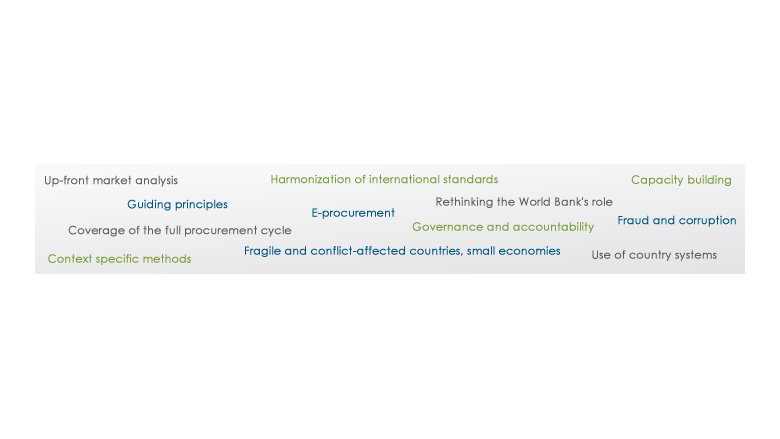| DATE |
TITLE |
LOCATION |
02/19/2013 |
Multi-stakeholder Consultation
|
Port-au-Prince, Haiti |
01/16/2013 |
Multi-stakeholder Consultation
Documents
|
Rome, Italy |
11/20/2012 |
Multi-stakeholder Consultation
Documents
|
Tashkent, Uzbekistan |
11/13/2012 |
Multi-stakeholder Consultation (by videoconference with Washington, DC)
Documents
|
Moscow, Russian Federation |
10/10/2012 |
Consultation with African Development Bank
Documents
|
Tunis, Tunisia |
10/08/2012 |
Multi-stakeholder Consultation (by videoconference: El Salvador, Honduras, Guatemala, Nicaragua and Dominican Republic)
Documents
|
Panama City, Panama |
10/04/2012 |
Consultation with Inter-American Development Bank
Documents
|
Washington, DC, United States |
10/03/2012 |
Consultation with Government Officials
Documents
|
Washington, DC, United States |
10/02/2012 |
Multi-stakeholder Consultation
Documents
|
Jakarta, Indonesia |
09/28/2012 |
Consultation with Government Officials of Khyber Pakhtunkkhwa and FATA
Documents
|
Islamabad, Pakistan |
09/27/2012 |
Roundtable on Procurement of Medical Equipment and Technology
Documents
|
Washington, DC, United States |
09/25/2012 |
Bilateral Meeting with Government Officials
Documents
|
Hanoi, Vietnam |
09/25/2012 |
Multi-stakeholder Consultation
Documents
|
Hanoi, Vietnam |
09/24/2012 |
Multi-stakeholder Consultation (by videoconference: Colombia)
Documents
|
Mexico City, Mexico |
09/21/2012 |
Multi-stakeholder Consultation
Documents
|
Brasilia, Brazil |
09/21/2012 |
Multi-stakeholder Consultation
Documents
|
Pasig City, Philippines |
09/20/2012 |
Multi-stakeholder Consultation
Documents
|
Buenos Aires, Argentina |
09/19/2012 |
Multi-stakeholder Consultation
Documents
|
Karachi, Pakistan |
09/19/2012 |
Consultation Meeting with Asian Development Bank
Documents
|
Manila, Philippines |
09/18/2012 |
Multi-stakeholder Consultation
Documents
|
Montevideo, Uruguay |
09/17/2012 |
Consultations with Government Ministries and Business Sector
Documents
|
Beijing, China |
09/17/2012 |
Meeting with Government Officials (by videoconference with Washington, DC)
Documents
|
Wellington, New Zealand |
09/17/2012 |
Multi-stakeholder Consultation
Documents
|
Lahore, Pakistan |
09/14/2012 |
Bilateral Meeting with Government Officials
Documents
|
Tokyo, Japan |
09/14/2012 |
Multi-stakeholder Consultation
Documents
|
Tokyo, Japan |
09/13/2012 |
Multi-stakeholder Consultation
Documents
|
La Paz, Bolivia |
09/13/2012 |
Consultation with Private Sector
Documents
|
Seoul, Korea, Republic of |
09/13/2012 |
Multi-stakeholder Consultation
Documents
|
Asunción, Paraguay |
09/11/2012 |
Bilateral Meeting with Government Officials
Documents
|
Lima, Peru |
09/07/2012 |
Multi-stakeholder Consultation (by audioconference: Samoa, Kiribati, Tonga)
Documents
|
Honiara, Solomon Islands |
09/06/2012 |
Multi-stakeholder Consultation (by audioconference: Samoa, Kiribati, Tonga)
Documents
|
Dili, Timor-Leste |
09/06/2012 |
Consultation with Government Officials
Documents
|
Quetta, Pakistan |
09/06/2012 |
Multi-stakeholder Consultation
Documents
|
Sydney, Australia |
09/05/2012 |
Bilateral Meeting with Government Officials
Documents
|
Canberra, Australia |
08/23/2012 |
Multi-stakeholder Consultation (by videoconference: Niger, Mali, Mauritania, Guinea-Bissau, The Gambia, Cape-Verde)
Documents
|
Dakar, Senegal |
08/22/2012 |
Multi-stakeholder Consultation (by videoconference: Chad, Burkina Faso, Benin, Togo, Cote d'Ivoire, Guinea)
Documents
|
Dakar, Senegal |
08/20/2012 |
Multi-stakeholder Consultation (by videoconference: Angola, Botswana, Lesotho, Malawi, Mozambique, Zambia and Zimbabwe)
Documents
|
Pretoria, South Africa |
08/16/2012 |
Multi-stakeholder Consultation (by videoconference: Ethiopia, Rwanda, South Sudan, Tanzania and Uganda)
Documents
|
Nairobi, Kenya |
08/14/2012 |
Multi-stakeholder Consultation (by videoconference: DRC, Congo, CAR, Chad, Burundi and Gabon)
Documents
|
Yaounde, Cameroon |
08/08/2012 |
Multi-stakeholder Consultations
Documents
|
New Delhi, India |
08/06/2012 |
Multi-stakeholder Consultations
Documents
|
New Delhi, India |
08/02/2012 |
Multi-stakeholder Consultation (by videoconference: Ghana, Liberia and Sierra Leone)
Documents
|
Lagos, Nigeria |
08/02/2012 |
Multi-stakeholder Consultations
Documents
|
New Delhi, India |
07/31/2012 |
Multi-stakeholder Consultation (by videoconference: Ghana, Liberia and Sierra Leone)
Documents
|
Abuja, Nigeria |
07/30/2012 |
Consultation with Individual Government Experts
Documents
|
New Delhi, India |
07/26/2012 |
Multi-stakeholder Consultation
Documents
|
Ottawa, Canada |
07/26/2012 |
Bilateral Meeting with Government Officials
Documents
|
Ottawa, Canada |
07/23/2012 |
Supplemental Multi-stakeholder Consultation
Documents
|
London, United Kingdom |
07/23/2012 |
Consultation with Federal Government Officials
Documents
|
Islamabad, Pakistan |
07/23/2012 |
Multi-stakeholder Consultation
Documents
|
Washington, DC, United States |
07/19/2012 |
Multi-stakeholder Consultation
Documents
|
Washington, DC, United States |
07/19/2012 |
Multi-stakeholder Consultation
Documents
|
Dhaka, Bangladesh |
07/18/2012 |
Consultation with Public Sector
Documents
|
Dhaka, Bangladesh |
07/13/2012 |
Multi-stakeholder Consultation
Documents
|
Kathmandu, Nepal |
07/03/2012 |
Consultation with Confederation of International Contractors' Associations
Documents
|
Paris, France |
07/02/2012 |
Multi-stakeholder Consultation hosted by MEDEF
Documents
|
Paris, France |
06/29/2012 |
Consultation with European Commission
Documents
|
Brussels, Belgium |
06/29/2012 |
Multi-stakeholder Consultation
Documents
|
Brussels, Belgium |
06/28/2012 |
Consultation with Private Sector
Documents
|
Berlin, Germany |
06/28/2012 |
Multi-stakeholder Consultation
Documents
|
Berlin, Germany |
06/28/2012 |
Multi-stakeholder Consultation
Documents
|
London, United Kingdom |
06/27/2012 |
Bilateral Meeting with Government Officials
Documents
|
London, United Kingdom |
06/27/2012 |
Multi-stakeholder Consultation hosted by the Ministry of Economic Affairs, Agriculture and Innovation
Documents
|
The Hague, Netherlands |
06/27/2012 |
Focus Group Discussion
Documents
|
Kabul, Afghanistan |
06/26/2012 |
Bilateral Meeting with Government Officials
Documents
|
Copenhagen, Denmark |
06/26/2012 |
Consultation with Confederation of Danish Industries
Documents
|
Copenhagen, Denmark |
06/25/2012 |
Consultation with UN Agencies
Documents
|
Copenhagen, Denmark |
06/12/2012 |
Consultation with Participants of the Workshop on Harmonizing Procurement Policies for Effective Regional Integration
Documents
|
Mombasa, Kenya |
06/11/2012 |
Consultation with Participants of Central Asia Regional Office Procurement Workshop
Documents
|
Issyk-Kul, Kyrgyz Republic |
06/05/2012 |
Consultation with participants of the Middle East and Northern Africa Procurement Conference
Documents
|
Amman, Jordan |
05/25/2012 |
Consultation with participants of the Eastern Europe and Central Asia Procurement Forum
Documents
|
Tirana, Albania |


